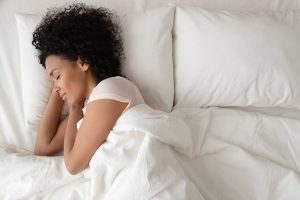
But a new study suggests that sleeping with a light on may be unknowingly keeping their nervous system awake and boosting their chances of further health problems.
A small study of 20 adults found that just one night of sleeping with the lights on led to changes in their bodies. Even though participants reported sleeping well, the light seemed to cause increases in sleeping heart rate and morning insulin production.
The effects were not significant, but the researchers suggested that these small effects on a nightly basis may ultimately impact a persons’ health.
Sleeping in the darkness definitely has benefits, however, you may not need total darkness. After all, humans used to sleep under the moonlight.
If you need to keep a nightlight for safety or just like to have one, try to pick one on the red/amber end of the light spectrum and not blue or white. You could also keep it low to the ground and even think about getting one with a motion sensor, so it is illuminated only when you’re up and on the move.
The real problems may be people aren’t exposing themselves to enough natural light during the day and too much artificial blue light—from electronic devices—in the evenings. These devices may suppress melatonin and make it harder to reach a restful state.
The study found that nightlights did not disturb melatonin. However, it found that they may have activated the sympathetic nervous system, which keeps people alert during the day.
Other research from 2019 found that women who slept with light or TV on tended to gain more weight over time and were more likely to become obese than those without light. It’s possible this could be tied to insulin.
If you can sleep without the lights on, go for it. If not, think about a motion sensor nightlight and consider the aforementioned tips.